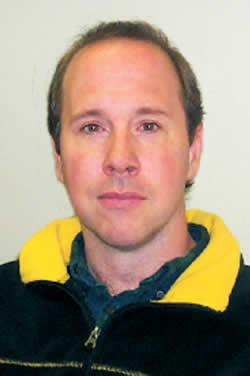
RICHARDSON, Texas (June 19, 2003) – Dr. Jeff DeJong, associate professor of molecular and cell biology at The
University of Texas at Dallas (UTD), has won a five-year, $1.29-million grant from the National Institutes
of Health (NIH) to conduct research into gene expression, which may provide insights into human reproduction
and fertility.
DeJong will study how genes are packaged in the nucleus
of cells and, in particular, how the packaging status changes as immature germ cells become mature
cells.
A gene is a hereditary unit that determines a particular
characteristic in an organism. Genes are pieces of Deoxyribonucleic acid, or DNA, and most genes
contain the information for making a specific protein.
DeJong’s research also will:
- Attempt to determine what protein factors are
associated with DNA and how those factors affect whether a particular gene is active or silent. - Explore how germ cells are able to “reset” themselves
to a state that allows embryonic development to proceed after fertilization.
“The work will focus on cells from reproductive
tissues and is expected to give insights into important areas of human health related to reproduction
and fertility,” said DeJong.
Last month, DeJong won a three-year, $150,000 grant
from the Welch Foundation of Houston to conduct research titled, “Biochemical Mechanisms of
Germ-Line Gene Regulation.”
DeJong holds a Ph.D. degree in biochemistry from Pennsylvania
State University and a B.A. degree in Biology from the University of Missouri-Columbia.
About UTD
The University of Texas at Dallas, located at the convergence of Richardson, Plano and Dallas in the heart
of the complex of major multinational technology corporations known as the Telecom Corridor,
enrolls more than 13,000 students. The school’s freshman class traditionally stands at the forefront
of Texas state universities in terms of average SAT scores. The university offers a broad assortment
of bachelor’s, master’s and doctoral degree programs.